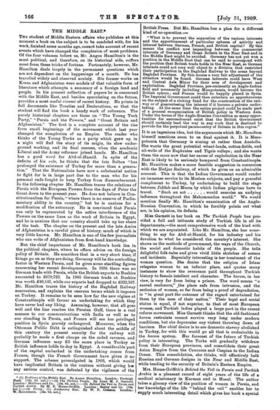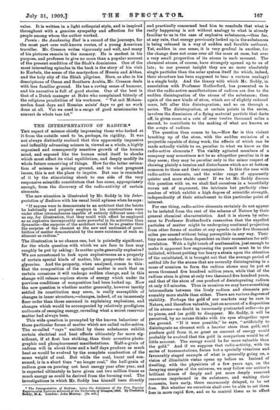THE MIDDLE EAST.*
THE student of Middle Eastern affairs who publishes at this moment a book on the subject is to be condoled with, for his work, finished some months ago, cannot take account of recent events which have changed the complexion of most problems. Of the four volumes before us, Mr. Angus Hamilton's is the most political, and therefore, on its historical side, suffers most from these tricks of fortune. Fortunately, however, Mr. Hamilton deals largely in the permanent questions which are not dependent on the happenings of a month. He has travelled widely and observed acutely. His former works on Korea and Afghanistan were models of that valuable form of literature which attempts a summary of a foreign land and people. In his present collection of papers he is concerned with the Middle East, and besides speculating on the future, provides a most useful resumk of recent history. He prints in full documents like Treaties and Declarations, so that the student will find the book a handy work of reference. The purely historical chapters are those on " The Young Turk Party," " Persia and the Powers," and " Great Britain and Afghanistan." The first is a complete account of the rise from small beginnings of the movement which last year changed the complexion of an Empire. The reader who thinks of the Young Turks as a party which grew up in a night will find the story of its origin, its slow under- ground working, and its final success, when the academic Liberal and the Army reformer joined hands. Mr. Hamilton has a good word for Abd-ul-Hamid. In spite of the defects of his rule, he thinks that the late Sultan "has prolonged the existence of Turkey for more than a genera- tion." That the Nationalists have now a substantial nation to fight for is in large part due to the man who for his personal ends fought to keep Turkey from dismemberment. In the following chapter Mr. Hamilton traces the relations of Persia with the European Powers from the days of Peter the Great down to the present year. He does not believe in Con- stitutionalism for Persia, " where there is no reserve of Parlia- mentary ability in the country," but he is anxious for a modification of the autocracy. He is convinced that Persia can only be regenerated by the active interference of the Powers on the same lines as the work of Britain in Egypt, and he is anxious that our country should take up her share of the task. The chapter on the present and the late Amirs of Afghanistan is a careful piece of history, much of which is very little known. Mr. Hamilton is one of the few journalists who can write of Afghanistan from first-hand knowledge.
But the chief importance of Mr. Hamilton's book lies in the political chapters, where be offers advice on the foreign policy of Britain. He considers that in a very short time, if things go on as they are doing, Germany will be the controlling factor in Western Persia, and he gives some startling figures concerning her recent developments. In 1895 there was no German trade with Persia, while the British exports to Bushire amounted to £679,723. In 1905 German trade at Bushire was worth 240,141, while our exports had dropped to £322,167. Mr. Hamilton traces the history of the Baghdad Railway concession, and explains the onerous terms which it imposes on Turkey. It remains to be seen how far the new regime at Constantinople will favour an undertaking for which they have never had any liking. Assuming, however, that all goes well and the line reaches the Persian Gulf, there is a real menace to our communications with India as well as to our standing in Persia, and France will see her privileged position in Syria gravely endangered. Moreover, when the Ottoman Public Debt is extinguished about the middle of this century the present annuity for the railway will probably be made a first charge on the ceded revenue, and German influence may fill the same place in Turkey as British influence holds to-day in Egypt. A considerable part of the capital embarked in the undertaking comes from France, though the French Government have given it no support. The scheme promulgated in 1903, which would have implicated Britain in the venture without giving her any serious control, was defeated by the vigilance of the
• (1) Problems of the Middle East. By Angus Hamilton. London : Eveleigh Nash. [12s. 6d. net.]—(2) The Turkish People. By Lucy M. J. Garnett London : Methuen and Co. [10e. 6d. net.]—(3) Behind the Veil in Persia and Turkish Arabia. By X. E. Hume-Griffith. London: Seeley and Co. [16s. net.]—(4) Persia: the Awakening Bast, By W. P. Cresson. London : W. Heinemann. [12s. Chl, net.]
British Press. But Mr.. Hamilton. has a plan for a different kind of co-operation
What is to prevent the separation of the various interests and the apportionment of particular spheres of activity and interest between German, French, and British capital By this means the conflict now impending between the commercial interests of Germany and Great Britain in the Near East and in the Middle East might be avoided. Germany has not yet won a position in the Middle East that can be said to correspond with the position that British trade holds in the Near East, so German interests could not very well object to a division that restricted their participation in the Baghdad Railway to the areas beyond Baghdad Province. By this means a very fair adjustment of the situation would be found. German interests could have West and Central Asia Minor for their area of development and exploitation. Baghdad Province, pre-eminently an Anglo-Indian field and necessarily including Mesopotamia, would become the British sphere ; and France would be happily placed in Syria. The Imperial Government could then entertain no apprehensions on the subject of a sinking fund for the construction of the rail- way or of guaranteeing the interest if it became a private under- taking. At the same timo the entire project could be made part of a general reorganisation of British policy in Western Asia. Under the terms of the Anglo-Russian Convention so many oppor- tunities for encroachment exist that the British Government should certainly lead the way in any work that is destined to provide for the perpetual paramountcy of Britain in this region."
It is an ingenious idea, but the arguments which Mr. Hamilton himself mentions seem to us final against it. It is Meso- potamia that Germany is aiming at rather than Anatolia.
She wants the great potential wheat-lands, cotton-fields, and oil-wells of the Euphrates and Tigris valleys ; and she wants them the more now that her career of exploitation in the Near East is likely to be seriously hampered from Constantinople. Mr. Hamilton makes a more feasible suggestion in connexion with the Hedjaz Railway, of which he gives us an admirable account. This is that the Indian Government would render an immense service to its Moslem subjects, and pay a graceful compliment to Turkey, by undertaking to build the stage between Jiddah and Mecca by which Indian pilgrims have to travel. " Such an act would exercise an undying influence throughout the 3Ilahommedan. world." We would mention finally Mr. Hamilton's examination of the Anglo- Russian Convention, in which he forcibly points out what are, in his opinion, its defects.
Miss Garnett in her book on The Turkish People has pro- vided a full and intimate study of Turkish life in all its departments,—the most comprehensive work of the kind with which we are acquainted. Like Mr. Hamilton, she has some- thing to say for Abd-ul-Hamid, for his industry and his devotion to what he considered the country's interest. She shows us the methods of government, the ways of the Church, the social and domestic habits of the people. She tells delightful folk-tales and gives vivid little sketches of scenes and incidents. Especially interesting is her treatment of the woman question. She denies that the religion of Islam relegates woman to an inferior place, and quotes many instances to show the reverence paid throughout Turkish history to female intellect and character. The harem, in her view, is very far from being a prison. The word means "a sacred enclosure," the place safe from intrusion, and the seclusion of women, so far from being a proof of degradation, is " in great part the outcome of the regard entertained for them by the men of their nation." Their legal and social status is equal, if not superior, to that of most European women, and Turkish ladies played a large part in the recent reform movement. Miss Garnett thinks that the old-fashioned harem, restraints cannot survive very long under modern conditions, but she deprecates any violent throwing down of barriers. Her chief desire is to see domestic slavery abolished in Turkey, for with this would go all that is undesirable in the harem, system. Her forecast of the future of Turkish policy is interesting. The Turks will gradually withdraw from their European provinces, and consolidate their great Asian Empire from the Caucasus and Caspian to the Indian Ocean. This consolidation, she thinks, will effectively balk Russian and German designs in the Near and Middle East, while tending to the security of Britain's Eastern Empire.
Mrs. Hume-Griffith's Behind the Veil in, Persia and Turkish Arabia is a pleasant record of eight years of the life of a medical missionary in Kerman and in Mosul. The author takes a gloomy view of the position of women in Persia, and her knowledge of the life " behind the veil" enables her to supply much interesting detail which gives her book a special value. It is written in a light colloquial style, and is inspired throughout with a genuine sympathy and affection for the people among whom the author worked.
Persia : the Awakening East is a record of the journeys, for the most part over well-known routes, of a young American traveller. Mr. Cresson writes vigorously and well, and many of his pictures remain in the memory. He is modest in his purpose, and professes to give no more than a popular account of the present condition of the Shah's dominions. One of the most interesting episodes in the book is the story of his visit to Kerbela, the scene of the martyrdom of Husein and Abbas, and the holy city of the Shiah pilgrims. Here, as also in his descriptions of Oman and Southern Arabia, Mr. Cresson deals with less familiar ground. He has a roving sense of humour, and his narrative is full of good stories. One of the best is that of a Dutch manager at Baku who complained bitterly of the religious proclivities of his workmen. " Vat mit Moham- medan feast days and Russian saints' days ye get no work done at all. Vat we need is a cargo of good missionaries to convert de whole tam lot."







































 Previous page
Previous page